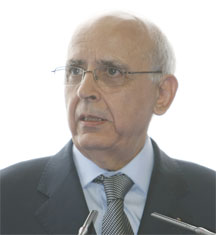TUNIS, (Reuters) – Tunisian Prime Minister Mohamed Ghannouchi resigned yesterday after violent protests over his ties to the North African state’s toppled former leader, triggering street celebrations in central Tunis.
Analysts said the move could add legitimacy to an election to replace President Zine al-Abidine Ben Ali, ousted on Jan. 14, but could also encourage further opposition demands.
Police fired shots in the air and used tear gas to disperse hundreds of youths breaking shop windows in a commercial district of Tunis shortly after the announcement, while thousands gathered near parliament to celebrate.

“We’re very happy, but it is not enough,” said one of the cheering crowd, who identified himself as Ahmed. “We want to see nothing more of this government.”
Critics have accused Ghannouchi of being too close to former ruler Ben Ali, toppled after a series of protests that sent shockwaves across the rest of North Africa and the Arab world and encouraged a similar uprising in Egypt.
He was replaced by Beji Caid Sebsi, a former foreign minister under independence President Habib Bourguiba, according to an announcement by interim President Fouad Mebazza.
“My resignation will provide a better atmosphere for the new era,” Ghannouchi said, adding he wanted to prevent more deaths. Five people have been killed since Friday in clashes between security forces and demonstrators at protests against Ghannouchi, according to the government.



